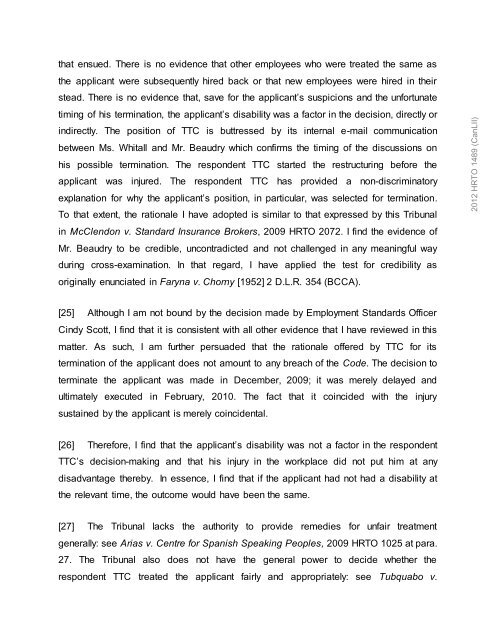FAQ's Cases - Stewart McKelvey
FAQ's Cases - Stewart McKelvey
FAQ's Cases - Stewart McKelvey
- No tags were found...
You also want an ePaper? Increase the reach of your titles
YUMPU automatically turns print PDFs into web optimized ePapers that Google loves.
that ensued. There is no evidence that other employees who were treated the same asthe applicant were subsequently hired back or that new employees were hired in theirstead. There is no evidence that, save for the applicant’s suspicions and the unfortunatetiming of his termination, the applicant’s disability was a factor in the decision, directly orindirectly. The position of TTC is buttressed by its internal e-mail communicationbetween Ms. Whitall and Mr. Beaudry which confirms the timing of the discussions onhis possible termination. The respondent TTC started the restructuring before theapplicant was injured. The respondent TTC has provided a non-discriminatoryexplanation for why the applicant’s position, in particular, was selected for termination.To that extent, the rationale I have adopted is similar to that expressed by this Tribunalin McClendon v. Standard Insurance Brokers, 2009 HRTO 2072. I find the evidence ofMr. Beaudry to be credible, uncontradicted and not challenged in any meaningful wayduring cross-examination. In that regard, I have applied the test for credibility asoriginally enunciated in Faryna v. Chorny [1952] 2 D.L.R. 354 (BCCA).2012 HRTO 1489 (CanLII)[25] Although I am not bound by the decision made by Employment Standards OfficerCindy Scott, I find that it is consistent with all other evidence that I have reviewed in thismatter. As such, I am further persuaded that the rationale offered by TTC for itstermination of the applicant does not amount to any breach of the Code. The decision toterminate the applicant was made in December, 2009; it was merely delayed andultimately executed in February, 2010. The fact that it coincided with the injurysustained by the applicant is merely coincidental.[26] Therefore, I find that the applicant’s disability was not a factor in the respondentTTC’s decision-making and that his injury in the workplace did not put him at anydisadvantage thereby. In essence, I find that if the applicant had not had a disability atthe relevant time, the outcome would have been the same.[27] The Tribunal lacks the authority to provide remedies for unfair treatmentgenerally: see Arias v. Centre for Spanish Speaking Peoples, 2009 HRTO 1025 at para.27. The Tribunal also does not have the general power to decide whether therespondent TTC treated the applicant fairly and appropriately: see Tubquabo v.
















